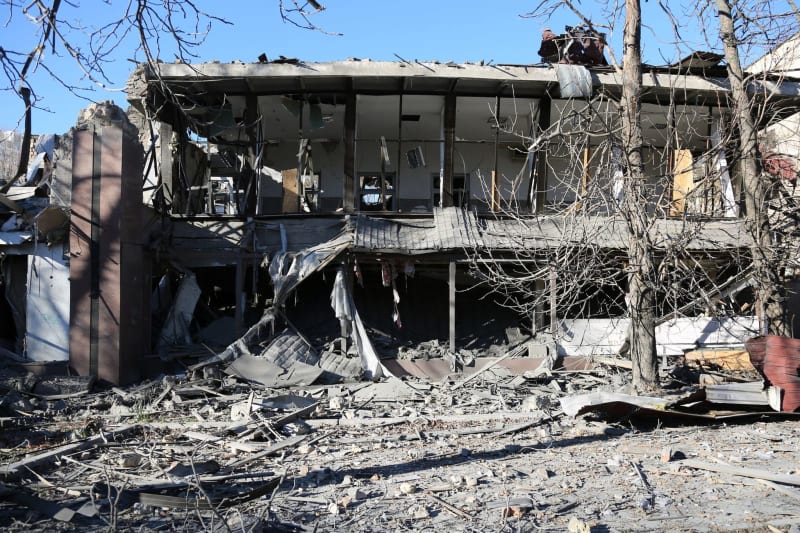Western powers responded defiantly to Moscow’s missile and nuclear threats on Tuesday, after a record Russian drone attack on Ukraine.
NATO Secretary General Mark Rutte urged the alliance to deliver greater military support for Ukraine, saying the alliance needs “to go further to change the trajectory of the conflict.”
The alliance must supply the air defences that Ukraine needs as well as deliver on military aid commitments already promised to Kiev at a NATO summit in Washington, Rutte said.
The military alliance also said that Moscow’s launch of an experimental ballistic missile against Ukraine last week will not deter it from supporting Kiev.
Senior Ukrainian military officials briefed NATO via video link at a meeting of the NATO-Ukraine Council, a consultation forum, on the Russian missile attack which targeted Dnipro.
NATO said in a statement the attack was another intimidation attempt against “those who support Ukraine as it defends itself against Russia’s illegal and unprovoked aggression.”
The Russian military has said that the new medium-range missile it fired at the Ukrainian city of Dnipro last week can hit targets across Europe and cannot be stopped by air defence systems.
The foreign ministers of the Group of Seven (G7) leading economies condemned Russia’s nuclear threats in their final declaration at the end of their two-day meeting in the Italian town of Fiuggi.
“We condemn in the strongest possible terms Russia’s irresponsible and threatening nuclear rhetoric as well as its posture of strategic intimidation,” the ministers wrote in their closing statement.
“We will never tolerate threats to use nuclear weapons, let alone any use of nuclear weapons,” the statement continued.
Moscow last week revised its nuclear doctrine, lowering the threshold for the use of such weapons. It now regards aggression by a state that does not have nuclear weapons itself, but that is supported by nuclear powers, as a joint attack on Russia.
The G7 includes Italy, the United States, Canada, the United Kingdom, Japan, France and Germany.
Record number of Russian combat drones used overnight
Russia launched a massive wave of overnight drone attacks at Ukraine, included 188 drones and four Iskander-M ballistic missiles, the Ukrainian air defence posted on Telegram on Tuesday.
The Ukrainian news portal Ukrainska Pravda said this was the largest number of drones launched by Russia in one night. In the capital, Kiev, the air raid siren sounded for more than five hours, according to official reports.
In the morning, the Ukrainian Air Force reported that it had shot down 76 drones in 17 regions of the country. The flights of 95 drones were aborted, presumably due to electronic countermeasures. Five drones are said to have flown in the direction of neighbouring Belarus.
According to the information provided, the power supply in Ukraine was once again affected by the attacks. In the western Ukrainian city of Ternopil, a critical infrastructure facility was damaged by drone attacks, the military governor of the area, Vyacheslav Nehoda, wrote on Telegram. The power supply in Ternopil and other places had been disrupted, he said.
Further deaths in southern and north-eastern Ukraine
At least four people were killed in Ukrainian mortar fire in the Russian-occupied city of Nova Kakhovka in the southern Ukrainian region of Kherson on Tuesday, the Moscow-appointed leadership in the city said.
The Ukrainian prosecutor’s office for the Kherson region has in turn launched an investigation into “enemy shelling of occupied Nova Kakhovka.”
According to the office, the bus was shot at by the Russian army at a bus stop.
Nova Kakhovka is located on the Russian-controlled southern bank of the lower reaches of the Dnipro River, which forms a de facto front line in the war.
At least two people also died in a Russian missile attack on the north-eastern city of Sumy, President Volodymyr Zelensky said in his evening address on Tuesday.
The missiles were fired from a multiple rocket launcher and hit a car repair shop, also damaging a nearby kindergarten.
“Protection against this is only really possible by destroying Russian weapons and Russian launch pads on Russian territory,” he said. “I am grateful to all partners who understand this and explain it to others.”
Kiev has only recently been able to use more long-range Western weapons systems from the US, United Kingdom and France against targets on Russian territory.
US-made ATACMS missiles used in attacks in Kursk, Russia says
The Russian Defence Ministry said on Tuesday that Ukraine used US-made ATACMS long-range missiles in attacks on the Kursk region in western Russia over the weekend.
It wrote on Telegram that at least three of the missiles could not be intercepted. The Russian military is preparing a response to the missile strikes, it said.
In the first attack, five ATACMS missiles were fired on an S-400 anti-aircraft missile system on Saturday, according to the Defence Ministry. Three missiles were reportedly destroyed, while two hit their target, wounding staff and damaging a radar station.
In another attack on an airfield, it said seven of the eight ATACMS missiles were shot down. The attack injured two soldiers and damaged infrastructure.
Moscow does not typically admit that Ukrainian attacks have hit military targets.
Germany announces €65m for Ukrainian energy infrastructure
Germany made further funds available to repair Ukraine’s energy infrastructure, allocating €65 million ($68 million) to the international Ukraine Energy Support Fund, Germany’s Economy Ministry announced.
German Economy Minister Robert Habeck stressed that Ukraine’s civilian energy infrastructure continues to be the target of massive Russian air strikes.
“A collapse of the energy supply in the third winter of war would have catastrophic consequences for the Ukrainian economy and population,” said Habeck.
